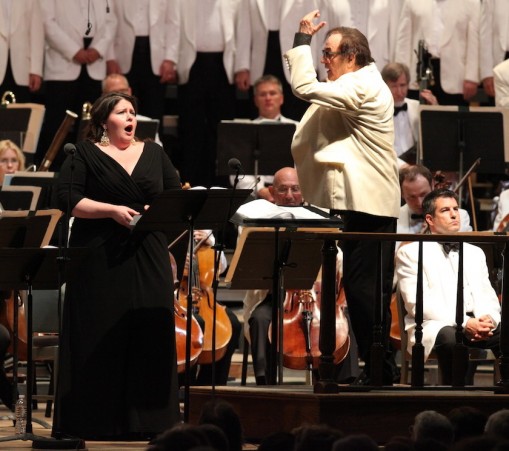Tanglewood opener makes superb showcase for young singers

Charles Dutoit leads the Boston Symphony Orchestra with soprano Angela Meade in opening night at Tanglewood. Photo: Hilary Scott
The Boston Symphony Orchestra’s opening event at Tanglewood Friday night bore the fingerprints, but sadly not the baton, of the man who conceived it.
James Levine may have left the building—or in this case, the Shed—but it’s clear his influence will be felt in the Boston Symphony’s programming for a while longer. While Charles Dutoit did an admirable and efficient job of leading this concert of Italian opera excerpts and a tone poem, it was hard not to wonder how the performance might have felt with Levine providing his trademark musical support to the mostly-young cast of singers.
To open an entire BSO Tanglewood season with an overture by Bellini is pretty weak beer—Bellini was, like his admirer Chopin, not a proficient orchestrator—but when that overture leads to Act I of Norma, things get interesting in a hurry. Like most first acts, this one occupies itself with establishing the characters and their situations. This might sound like routine stuff, but when the title character’s establishing aria is Casta diva, it’s clear that the composer is looking to hit a home run in his first at-bat.
Accordingly, the opening music for the Druid leader Oroveso (sung here by the veteran of the cast, bass-baritone James Morris) and his warriors (men of the Tanglewood Festival Chorus) is uncommonly dramatic, as the leader has to restrain his men from attacking the Romans prematurely. Morris, man of many Wotans, knows how to handle operatic situations like this, and dispatched this one with sensitivity and vigor.
Tenor Roberto De Basio was in splendid voice as Pollione, the Roman proconsul who is in love with the Druid priestess Norma yet sworn to oppress her people. His tone was creamy-textured, consistent and beautifully-produced from top to bottom. People can argue about how much “acting” one should do in a concert performance, but it seems De Basio could have done more. It takes greater dramatic commitment as well as fine singing to convey Pollione’s terror after dreaming of Norma’s vengeance on him, as well as his fierce determination to put down the Druid rebellion, however much blood and destruction is required.
Matthew DiBattista’s sharper, more astringent tenor made a satisfying contrast with De Basio’s creamy tone in the role of Flavio, Pollione’s sidekick.
Bellini himself termed the role of Norma “encyclopedic,” because it calls for a soprano capable of turning on a dime from coloratura to lyric to dramatic. Soprano Angela Meade, a 2007 winner of the Met National Council Auditions who has appeared with top regional orchestras and at the Met itself (as Elvira in Ernani and the Countess in Figaro), went 2-for-3 which is not bad in baseball or opera. The necessary dramatic fire wasn’t quite there for her first entrance, loudly denouncing Druid hotheads and predicting the eventual downfall of the Roman Empire. It was hard to tell why everybody in the cast (and maybe the conductor too) is so terrified of her.
However, Meade held the audience rapt in Casta diva, the priestess’s gorgeous, trance-like prayer to the moon, and later, singing of her love for the despised proconsul, Meade sent coloratura passages flashing like streaks of lightning through her cabaletta.
In the role of Adalgisa, Norma’s acolyte, mezzo-soprano Kristine Jepson, took honors for the night when it came to combining a fine voice with projecting the character’s emotions. No need to read the synopsis this time: Adalgisa is terrified—of Norma, of course, but also that Pollione, whom she loves, will choose his duty over her. Then she is (somewhat) reassured when, in the act’s concluding duet, the proconsul promises to take her to Rome with him. Jepson’s rendering of this scene provided the most affecting singing of the night.
Meade, De Basio and Morris returned later in the evening for the Trio from Act III of Verdi’s I Lombardi, in which, at the urging of his Christian lover, a dying Muslim warrior is converted to Christianity by a kindly hermit. De Basio helped create the mood with some exquisite pianissimo singing, and Meade soared atop the surge of a classic Verdi ensemble. Concertmaster Malcolm Lowe deftly executed the scene’s remarkable prelude, a brilliant and lyrical mini-concerto for solo violin.
Between the opera scenes, Dutoit led a smart, propulsive account of Rossini’s Guillaume Tell Overture with notably expressive solo contributions from cellist Jules Eskin and English hornist Robert Sheena.
After the Druids, Lombards, and Swiss rebels had their fun, the Empire struck back in Respighi’s spectacular Pines of Rome. Dutoit summoned the requisite, Shed-rattling brass tsunami at the end, while not neglecting such other Technicolor moments as the jangle of kids playing, the spooky catacombs, and the fragrant pleasures of the night garden.
[This article appeared originally on The Classical Review, July 9, 2011]
Posted in Performances




